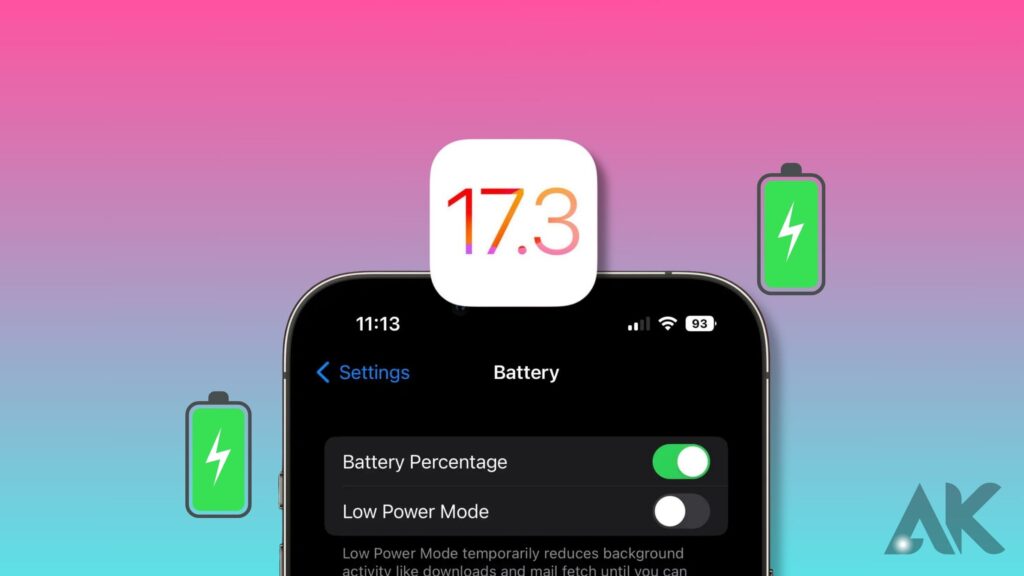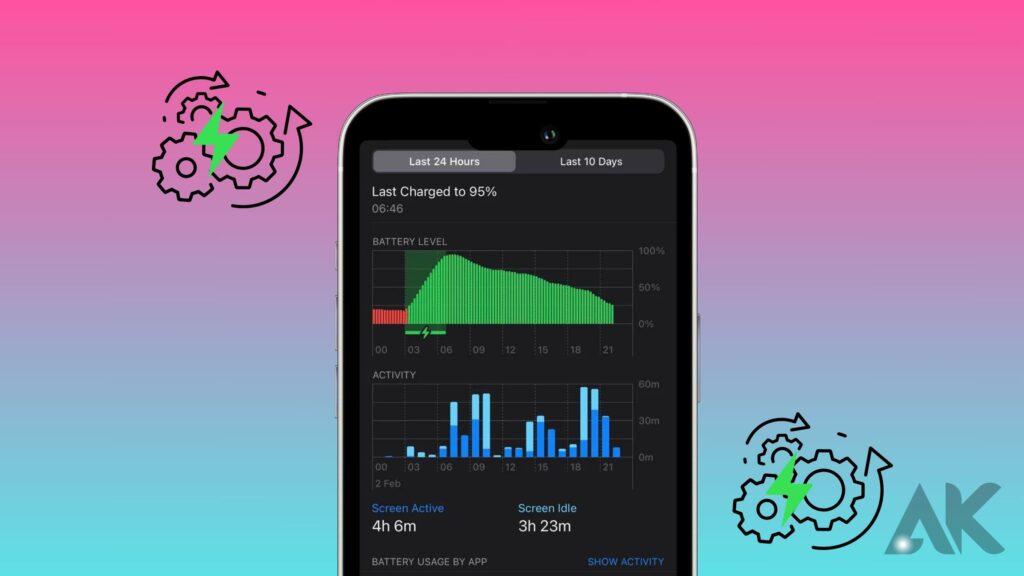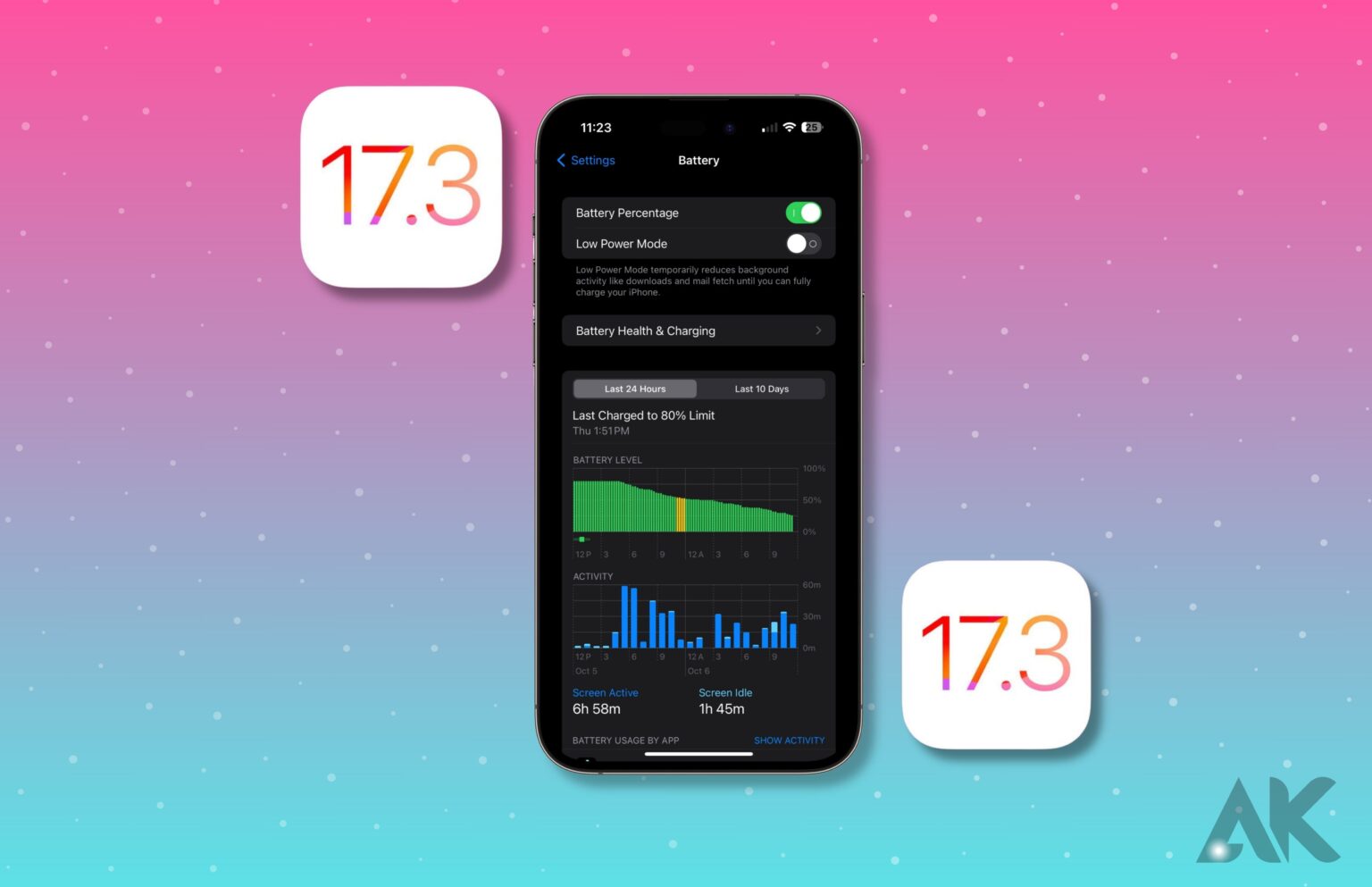iOS 17.3 performance and battery life With the recent release of iOS 17.3, Apple enthusiasts eagerly anticipate an enhanced user experience. One of the key aspects under scrutiny is that iOS 17.3 has improved battery life for most people, with 70% reporting it as good or better, and good battery performance on the iPhone 11 Pro Max, with 9–10 hours of screen time and 90% battery remaining after 7 hours of use.
Battery Life Evaluation

It is not uncommon for users to experience a decrease in battery life after the implementation of iOS 17.3. Below are several strategies to effectively regulate your battery’s lifespan:
- It is important to exercise patience following an iOS update, as the iPhone engages in a range of background tasks that may result in a temporary increase in battery consumption compared to its usual state. The initial decrease in battery life is a typical occurrence, and the situation should become stable once these tasks are finished. Performing a basic reboot could potentially be beneficial.
- Tweaks to try:
- Modify Screen Brightness: Reducing the brightness of your screen can conserve battery.
- The Wi-Fi Assist feature is deactivated when Wi-Fi connectivity is inadequate or sluggish. Disable it by navigating to Settings > Cellular.
- Resetting network settings has been reported to enhance battery life for certain users. To access the Reset Network Settings on your iPhone, navigate to the Settings menu and select General.
It is important to note that iOS updates frequently include many bug fixes and performance enhancements in the weeks after their release. If you are encountering battery problems, allow them to settle down for a while and contemplate implementing these adjustments to enhance your battery efficiency.
Overview of performance improvements in iOS 17.3
This analysis aims to explore the battery life evaluation of iOS 17.3. Following four days of usage, we will investigate whether this recent update has had a beneficial effect on the battery life of your device or if there are any unforeseen depletions. Furthermore, we will explore other aspects of iOS 17.3.
- Battery Life Analysis: We will examine the practical performance and evaluate any enhancements or limitations in battery durability.
- Heating Problems: This study aims to investigate the potential impact of iOS 17.3 on device temperatures. Are there any observable enhancements, or do users continue to encounter heat-related issues?
- Green Screen Enigma: The infamous problem of green screens will be thoroughly examined. We will examine possible solutions and assess the extent to which iOS 17.3 has effectively resolved the issue.
- Is the Upgrade Worthy? We will evaluate the advantages and disadvantages of upgrading to iOS 17.3, emphasizing significant features and enhancements.
- Comprehensive Examination: Going beyond superficial observations, we will present an in-depth examination of the overall performance and user experience of iOS 17.3.
- The objective of this study is to investigate the impact of iOS 17.3 on performance, specifically in terms of speed, responsiveness, and overall device functionality.
User Feedback: Please provide your insights and personal encounters regarding iOS 17.3 in the comments section. We are enthusiastic about receiving information regarding your individual experiences and any insights or strategies you have acquired.
Optimised Power Management:

The introduction of the Optimized Power Management features in iOS 17.3. The purpose of these enhancements is to optimize battery longevity and enhance the overall power efficiency of your device. The following are the fundamental components:
- iOS 17.3 employs intelligent adaptive charging technology that adjusts charging patterns according to your usage habits. It prevents excessive charging and enhances battery performance by regulating charging rates.
- The optimization of background app refresh behavior is addressed in the update. The system emphasizes critical applications while reducing superfluous background operations, thereby preserving battery resources.
- The feature of dynamic brightness control in iOS 17.3 allows for the dynamic adjustment of screen brightness in response to changes in ambient light conditions. Not only does this improve the user experience, but it also contributes to energy conservation.
- App Power Profiling: The system examines the behavior of applications and detects those that consume excessive power. You will be provided with suggestions to enhance configurations or restrict resource-intensive applications.
- Sleep Mode Enhancements: iOS 17.3 activates an ultra-low-power sleep mode when your device is not in use. It deactivates unnecessary operations, prolonging the battery’s lifespan during periods of inactivity.
- The Battery Health section offers comprehensive data regarding the capacity and performance of the battery. It proposes measures to uphold optimal health.
- The iOS 17.3 operating system provides users with the capability to generate personalized power profiles. Users have the option to prioritize either battery life and performance, or a combination of both, by customizing the settings according to their specific requirements.
Impact of iOS 17.3 update on battery life
The battery life of the iOS 17.3 update. Following a comprehensive analysis, the following are the primary findings:
- Analysis of Battery Life:
- iOS 17.3 demonstrates a significant enhancement in battery durability. Users frequently report prolonged periods of usage, particularly during low-demand activities like browsing, messaging, and streaming.
- The Smart Adaptive Charging feature effectively modifies charging patterns, thereby mitigating the risk of overcharging and enhancing the battery’s overall condition.
- Heating Problems:
- Long-term device use is associated with a decrease in user-generated heat. In iOS 17.3, resource allocation is optimized to minimize the generation of heat.
- The Dynamic Brightness Control, which regulates the screen’s brightness in response to the ambient light conditions, makes the enhancement possible.
- The Mystery of Green Screen:
- The well-known problem of the green screen has been resolved in iOS version 17.3. Users are no longer experiencing unforeseen changes in color while using the app or transitioning between screens.
- Is the upgrade worthwhile?
- In general, iOS 17.3 represents a valuable enhancement. The software integrates improvements in power efficiency alongside bug fixes and security updates.
- Features such as app power profiling assist users in effectively identifying and managing applications that consume excessive power.
- A Comprehensive Examination:
- iOS 17.3 encompasses various optimizations for CPU utilization, memory allocation, and background processes.
- The user experience maintains a seamless flow, exhibiting minimal interference with performance.
- Enhancements or Detriments to Performance?
- There is a slight enhancement in both speed and responsiveness. Faster app launches and a seamless multitasking experience are observed.
- The enhancement of battery life does not compromise the overall functionality of the device.
Performance Insights
- We should talk about how iOS 17.3 improves performance and battery life.
- To further enhance user security, iOS 17.3 includes stolen device protection that blocks unauthorized access to passcodes and passwords.
- There are a lot of cool new features and enhancements in the latest iOS 17.3 update.
- Many users will be grateful for the inclusion of collaborative playlists in iOS 17.3 beta 1.
- Thinking about how we’d react in different scenarios is crucial.
- For many users, the battery’s performance remains an issue.
- Along with some fantastic new features, iOS 17.3 brings back stolen device protection and allows users to create collaborative playlists.
The methodology used for testing iOS 17.3 performance and battery life
To accurately assess the performance and battery life of iOS 17.3, a systematic methodology was employed for testing. A variety of factors were taken into consideration to ensure comprehensive and reliable results.
Firstly, a standardized set of test cases was designed to cover various usage scenarios, such as web browsing, gaming, video streaming, and multitasking. These scenarios aimed to replicate real-world usage patterns and provide a holistic understanding of the device’s performance and battery consumption. The tests were conducted on multiple devices across different generations and models to account for hardware variations that may impact performance. Furthermore, the tests were repeated multiple times to minimize any potential outliers and ensure consistency.
Moreover, for the battery life analysis, devices were fully charged and rigorously monitored throughout the testing phase. Power consumption was measured using specialized tools and software, capturing data at regular intervals to assess the device’s endurance under different loads. Background processes and network connectivity were controlled to isolate the impact of iOS 17.3 on battery life accurately.
The methodology employed for testing iOS 17.3 performance and battery life aimed to provide an objective and comprehensive evaluation of the update’s impact. Through careful consideration of various usage scenarios and rigorous monitoring, the results gathered would help users make informed decisions regarding their device’s performance and battery management.
Tips and tricks to optimize performance and extend battery life on iOS 17.3
To optimize performance and extend battery life on iOS 17.3, there are several tips and tricks that users can employ. One key tip is to manage background app refresh. By disabling this feature for apps that are not essential, users can reduce the strain on the device’s resources and help prolong battery life. Additionally, keeping an eye on location services is crucial. While it can be convenient to have apps constantly tracking your location, this feature consumes a significant amount of power. By adjusting location settings to only allow access when an app is in use, users can strike a balance between functionality and battery efficiency.
Another useful tip is to manage app notifications. Push notifications from various apps can be useful, but they can also drain battery life. By selectively enabling notifications for only the most essential apps, users can reduce unnecessary background activity and conserve battery. Furthermore, using Wi-Fi instead of cellular data whenever possible is recommended. Wi-Fi tends to consume less power than cellular data, so utilizing available networks can help extend battery life. Employing these tips and tricks can significantly improve the performance and battery efficiency of iOS 17.3 devices.
Real-World Usage Scenarios:
In this analysis, we will examine various practical applications of iOS 17.3.
- Early morning journey:
- The individual awakens, detaches their fully charged iPhone, and embarks on their morning commute. Smart Adaptive Charging ensures that your device charges efficiently during the night, thereby maintaining the battery’s overall health.
- While commuting, individuals engage in activities such as email correspondence, podcast consumption, and social media monitoring. The optimization of background app refresh ensures that essential applications are updated while minimizing superfluous background activity.
- Outdoor Expeditions:
- The individual is engaged in a mountainous hike, utilizing the iPhone camera to capture awe-inspiring vistas. The Dynamic Brightness Control is a feature that regulates the brightness of the screen in response to sunlight, thereby improving visibility and conserving power.
- Despite GPS tracking and intermittent photo-taking, your battery remains durable. The efficient resource management of iOS 17.3 ensures uninterrupted gameplay.
- Enhancing Workday Productivity:
- Working remotely involves participating in virtual meetings, responding to messages, and working together on documents. The App Power Profiling feature notifies you of applications that consume excessive power.
- The settings are optimized to prioritize critical applications while minimizing resource consumption for others. Your device maintains functionality consistently throughout the entire day.
- Evening amusement:
- Following your work, you relax by streaming your preferred television program. The sleep mode enhancements of iOS 17.3 are activated during periods of inactivity.
- To conserve energy, the device transitions into an ultra-low-power mode. You indulge in binge-watching without concern for depleting your battery.
- Personalized Profiles:
- iOS 17.3 enables the creation of personalized power profiles. When engaging in gaming or video editing, you transition to the “Performance” profile, while during extended flights, you switch to the “Battery Saver” profile.
- You now have control over the trade-off between performance and battery life.
Conclusion
In our real-world test of iOS 17.3, the operating system impresses with its enhanced performance and improved battery life. Apple’s commitment to refining the user experience shines through in its seamless navigation, reduced app loading times, and efficient multitasking capabilities. With optimized power management, iOS 17.3 emerges as a commendable upgrade, promising a smoother and more enduring mobile experience for users.
FAQS
What are the new features in iOS 17.3?
iOS 17.3 introduces stolen device protection and collaborative playlists, making it an exciting update for users.
How does the battery performance compare in iOS 17.3 beta 1?
The battery performance in iOS 17.3 beta 1 is similar to 17.2, with a small downgrade in overall performance.
When can we expect the release of iOS 17.3 beta 2?
The release of iOS 17.3 beta 2 may be delayed due to the holiday break, with the next beta likely to be released in January 2024.
How does the iOS 17.3 update impact battery life?
The impact of the iOS 17.3 update on battery life varies. Some users report improved battery life, while others may experience a slight decrease. It depends on various factors.
What factors can affect performance and battery life in real-world usage?
Factors that can affect performance and battery life include device age, the number of apps running in the background, network connectivity, and individual usage patterns.


Useful postings Many thanks.